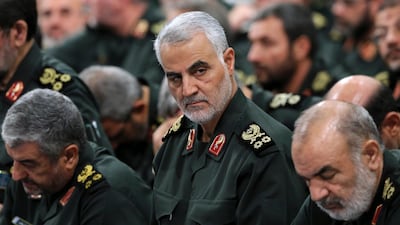Qatar made secret payments totalling at least $275 million (Dh1 billion) to Iraqi and Iranian officials widely believed to be sponsors of international terrorism in order to secure a hostage release last year, intercepted messages suggest, a development that observers say shows how the tiny Gulf state is playing “video games” with the region.
The payments were made just days after a 25-member Qatari hunting party, including nine members of the royal family, were released last year after being kidnapped in southern Iraq, according to a conversation between the Qatari Foreign Minister Mohammed bin Abdulrahman Al Thani and its ambassador to Iraq, Zayed bin Saeed Al Khayareen, who served as chief negotiator, the Washington Post first reported.
Most galling for Qatar’s Gulf neighbours was to who its senior diplomats made the payments: a series of officials with links to the funding of extremism throughout the Middle East. The Qataris were abducted in southern Iraq in December 2015 and, although no group publicly claimed responsibility, the intercepted communications appear to show Doha dealing with a wide range of actors to obtain their release.
At least $50 million (Dh183m) was set aside for “Qassem”, or Qassem Soleimani, the shadowy leader of the Iranian Revolutionary Guard Corps’ (IRGC) Quds Force that sponsors Tehran’s proxy groups across the Middle East, including Hezbollah in Lebanon, Houthi rebels in Yemen and Shiite militias in Iraq.
At least $150 million was handed to five individual intermediaries in total, the Post said, including the leader of Kataeb Hezbollah, an Iran-backed Iraqi militant group marked by the US as a foreign terrorist organisation. Included in the deal were also Hezbollah, Iran’s prized militia, and the Al Nusra Front, a Syria-based extremist group with links to Al Qaeda.
The Qatari officials’ phone conversations, text messages and voicemail messages were recorded by a foreign government who provided them to the Post on the condition it was not named, the newspaper said. The ransom payments, which Qatar has denied making, have been widely criticised by fellow Gulf Arab states for providing funding to terrorist organisations.
Qatari officials originally attempted to make the ransom payment in Iraq, but when officials sequestered and froze some $360 million inside 23 duffel bags, the Qataris looked for another payment route: Lebanon. The money was then sent through Beirut’s Rafik Hariri International Airport to Iranian sponsor Hezbollah where it would make its way to Tehran, according to the New York Times.
The revelations were just another confirmation of what many observers in the region already knew: that Iran’s tentacles had stretched into many corners of the Middle East, and that Qatar was paying for them to reach further.
“It just goes to show you how much the IRGC is entrenched across the region," Mohammed Alyahya, senior fellow at the Gulf Research Centre, said of the deal and the warming ties between Iran’s security elite and the Qatari regime.
"I think that's one of the biggest factors that broke the camel's back in terms of people's assessment of Qatar in intelligence and security circles: the idea of Shiite militias and Sunni militias getting secretly flushed with cash by Qatar,' Mr Alyahya told The National by phone. "And we're not talking about one million or two million dollars, we are talking about hundreds of millions of dollars."
_____________
Read more
Qatari spy describes cold war against UAE
Qatari officer reveals role in plot against UAE, Saudi Arabia
_____________
Iraqi officials say it is no secret what is happening in their country. Iran, bolstered by such lucrative funds, is influencing events in the neighbouring country. For instance, the hunting party was being held by Iranian-funded Shiite militia Kataeb Al Imam Ali, linked to Kataeb Hezbollah.
"The latest Qatari revelations highlight the extent of foreign interference and the dismissal of Iraqi sovereignty whatsoever," a spokesperson of Iraq's National Alliance bloc, which is led by Iraqi Vice President Ayad Allawi, told The National by phone. "Regional states have been destabilising the country and have fuelled terrorism in the region".
Jaber Al Jaberi, an Iraqi lawmaker representing Anbar, said that “Iran’s interference in Iraq has always been apparent, this is not something new” and that “their obstruction in Iraqi issues has always been for their own interests”.
A former European diplomat told The National that while they were not aware of the IRGC accepting funding from outside parties such as Qatar, "opportunistic benefit from a particular situation might conceivably be treated differently though" by the elite arm of the Iranian military.
It is this opportunistic streak that can be seen clearly in Tehran’s dealings with Qatar on the hostage release, Mr Alyahya said, with Iranian officials appearing to capitalise on Doha’s wanton adventurism.
“It’s very clear that the Iranians were taking the Qataris for a ride. They were literally swindling them," he said of the large sums in question.
“It’s almost like the Qataris consider regional developments and unrest a video game that they can play when they are bored and walk away from when it gets difficult," he continued. “They will fund Jabhat Al Nusra a little bit, then after that they will go and fund other Al Qaeda-linked groups without scrutiny, despite US and Saudi warnings, despite Emirati warnings. They put money in the hands of criminals."
Qatar, by their own admission, knew the game that Iran was playing.
“The Syrians, Hezbollah-Lebanon, Kataeb Hezbollah, Iraq — all want money, and this is their chance," Mr Al Khayareen wrote in an April 2017 text message to the Qatari foreign minister. “All of them are thieves."
But the exchanges provide the clearest evidence yet that Doha’s top officials went along with Tehran’s pricey dance, regardless of the consequences.

